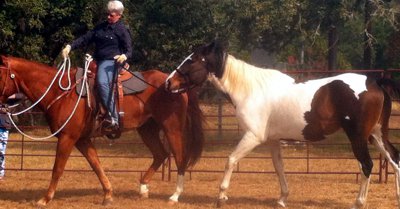Strategies for Optimum Drinking
Everyone has heard the saying, “You can lead a horse to water but you can’t make him drink.” We must ask ourselves why the horse won’t drink, and in some cases ask the opposite: why do they drink so much?
First, the problem of not drinking enough. Some horses will not drink water simply because they do not like or are not used to the taste. If you have one of these guys, find a flavor such as Gatorade or apple cider vinegar and add it to the water to encourage drinking. Many people add salt or electrolytes to feed to encourage drinking – and this works well in some horses – but I will explain why it is not a good idea for all horses. Some horses do not drink well because of internal dampness, which is associated with the spleen and is characterized by heaviness, stickiness and edema. If your horse has a tendency to stock up in his legs, have puffiness under the eyes, swelling or thick coating on his tongue or susceptibility to moist skin eruptions, he may have internal dampness. Salt or electrolytes may actually worsen his condition by creating more moisture in his system. Bitter foods such as alfalfa or blue-green algae tend to be drying and are excellent for the damp horse to help with water balance. Too much fat in the diet may also contribute to dampness.
Some horses prefer drinking from a trough over a bucket or automatic waterer. If your horse is like this but must live in a stall, consider using one of those large plastic muck buckets set on the floor in one corner. If your horse has sore teeth he will back off on water drinking especially if the water is cold.
If you can’t get your horse to drink, cut out his grain and cut back on his hay until you solve the problem. Offer fresh grass, bran mashes and moisture rich treats such as carrots, apples or watermelon.
If your horse drinks well above his normal 8-10 gallons, it could indicate a serious health problem such as kidney failure or Cushing’s disease. Blood tests can be used to determine if these conditions exist. If your horse’s blood work looks normal, consider the protein levels in the diet. If your horse is receiving more protein than he needs he will have to drink more water to excrete the extra protein in the urine. If this is the cause the urine will be thick with a strong odor of ammonia.
If your horse drinks excessively and his urine is clear and odorless he may be drinking out of boredom. Horses that spend long hours idle in a small pen or stall will get stir-crazy. The obvious solution to this is actually prevention. Keep hay in front of your horse or provide some form of entertainment. If your horse consumes large amounts of salt, provide it only in daily turnout or only at dinner time.
If your horse has been drinking large amounts for a long time he may have lost his ability to concentrate his urine. Before limiting his access to water have your vet check him carefully for dehydration and monitor his condition carefully as you very slowly limit his water consumption. You may want to offer some water with electrolytes added to help him replace the electrolytes he has flushed out of his system. If your horse continues to drain his water buckets you may want to look at acupuncture or homeopathic treatment to address extreme thirst as well as any other chronic disease symptoms.
About the Author
Madalyn Ward, DVM, owns Bear Creek Veterinary Clinic in Austin, Texas. She is certified in Veterinary Homeopathy and Equine Osteopathy.
Memberships include American Veterinary Medical Association, American Association of Equine Practitioners, American Holistic Veterinary Medical Association, Texas Veterinary Medical Association and the Academy of Veterinary Homeopathy.
She has authored several books and publishes at her blog.
